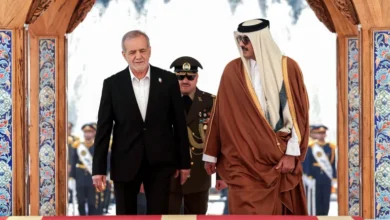‘Pipe dream’: Why is the US pushing the Palestinian Authority to lead Gaza?

United States officials have increasingly suggested that the Palestinian Authority (PA) should rule over Gaza after Israel achieves its objective of eliminating Hamas, the group that currently controls the territory.
But analysts warn that the proposal may be unrealistic and premature, as the Israel-Hamas war nears the start of its seventh week.
US President Joe Biden and his top aides have repeatedly expressed full support for the Israeli offensive in Gaza, but Washington has nevertheless offered indications of what it would like to see after the conflict.
The Biden administration said it does not support an indefinite Israeli military presence in the territory, and it opposes downsizing the besieged strip or permanently displacing its population.
But if Israel manages to dislodge Hamas from Gaza — a goal that is far from guaranteed — bringing the PA back to Gaza would face many hurdles, including Israeli opposition.
Earlier this month, PA President Mahmoud Abbas seemed to predicate the authority’s return to Gaza on the condition that a “political solution” to the conflict is reached, one that would include the establishment of a Palestinian state with East Jerusalem as its capital.
“At several different levels, this is just a pure pipe dream,” Osamah Khalil, a history professor at Syracuse University, said of handing Gaza to the PA.
Why is the US pushing for it?
Khalil said the Biden administration is facing mounting pressure over its support for Israel, due to the atrocities it is accused of committing in Gaza. At least 11,500 Palestinians have been killed so far, with United Nations experts warning of a “grave risk of genocide” in the territory.
He added that there is “an absolute dearth of fresh ideas in Washington”, leading to a policy of “avoiding conflict resolution and focusing on conflict management”.
Both the US and Israel have ruled out the possibility of dealing with Hamas politically after the war.
How did we get here?
The PA — which is controlled by the Palestine Liberation Organisation (PLO) and its dominant faction, Fatah — was established in 1994 as part of the Oslo Accords, which sought to shift the occupied Palestinian territories from Israeli military control to civilian leadership.
Oslo promised an eventual Palestinian state, but the so-called peace process never led to a resolution to the Israel-Palestine conflict.
Over the next decade, the PA continued to oversee a limited form of self-governance over the West Bank and Gaza, co-existing with the Israeli occupation that has had near total control over security matters in the Palestinian territories.
In 2005, Israel unilaterally withdrew its military forces and dismantled its settlements in Gaza, but it maintained control over movement in and out of the coastal enclave.
One year later, Hamas won the Palestinian legislative elections in a blow to the PA.
With Hamas committed to armed struggle against Israel and the Fatah sticking to the peace process, the two parties were not able to reconcile their differences.
Meanwhile, Hamas faced increasing international pressure, and fighting broke out between the group and the PA. In 2007, Hamas took over Gaza and has maintained control of the territory ever since. For its part, the PA remained in the West Bank as Israel proceeded with its settlement expansion there.










